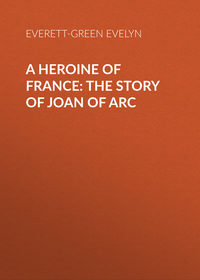 полная версия
полная версияA Clerk of Oxford, and His Adventures in the Barons' War
Presently they came upon a group gathered beneath the shade of some large oak trees, and heard themselves hailed in tones of welcome. This group consisted of the Seaton family, and the beautiful twins, Lotta and Linda. Pedro Balzani, not desiring that his daughters should remain in the inn when it was like to be crowded from garret to basement by fine gallants in the train of the Earl of Leicester, had asked of his neighbours the Seatons houseroom for them at this season, Joanna Seaton being the great friend of the twin sisters. The whole party had come forth to picnic under the greenwood trees and watch the show go by. And now, as was but natural, these four comrades, who always consorted more or less together, were invited to share in the remains of the repast, and to join the pleasant party.
Nothing loth, they all sat down, and having been too excited to provide themselves with dinner, were glad enough of some of Dame Seaton's excellent fare. By this time all the party were very well acquainted – laughter and fun were the order of the day. By this time Leofric had come to distinguish as a rule between the twin sisters, although he frequently made a mistake which evoked amusement and banter. Hugh never made any mistake now, and always gravitated towards Linda, the gentler of the two girls. Leofric sometimes wondered whether or not he was beginning to love the maiden. She was certainly very sweet and winning, yet she was but the daughter of an innkeeper, and half a foreigner to boot; whilst Hugh was a gentleman's son, and might hope one day to win his spurs.
The sun overhead shone down hotly, though beneath the trees it was pleasant enough. The afternoon was wearing on, and excitement had become intense.
At last the long-waited-for sounds arose, telling of the approach of a number of riders. Rushing helter-skelter along the dusty road came bands of clerks and others, who had gone on towards Abingdon, and now came pouring back towards the city with the cry on their lips, —
"They come! they come!"
All sprang to their feet. The youths helped the maidens to clamber into good places of observation amid the branches of a gnarled old oak, blasted by lightning, that stood hard by the road. Then they drew themselves up bare-headed beneath, prepared to swell the shout of welcome which arose as soon as the foremost horsemen hove in sight. Leofric strained his eyes to gaze at the oncoming procession, for it was such a sight as his eyes had never looked upon before.
Hugh stood close beside him, his eyes shining with excitement and anticipation. The tramp of horse-hoofs and the ringing sound of armour made itself heard through the still, clear air.
"Come they in arms?" whispered Gilbert with bated breath, for he was not prepared for that. Yet, sure enough, as the first ranks of the horsemen rode up, it was plainly to be seen that they were armed from top to toe – a brave spectacle in truth, yet one that the by-standers had scarcely expected to see.
Row after row, row after row of bravely-trapped horsemen passed by at a gentle trot, and still Hugh made no sign. Then he suddenly grasped the arms of those next to him, and exclaimed, —
"There he is! there he is! Is he not a right royal man?"
Leofric's gaze was instantly fastened upon the eagle-like face of a warrior in a richly-chased coat of mail, with a plumed head-piece on his head – a man who sat erect in his saddle, returning the greetings of the by-standers with a grave dignity of demeanour – a man who looked born to command and born to rule, and who, in spite of his own foreign blood, was at this moment the champion of England's liberties, the enemy of those hordes of foreign aliens who were preying upon the land to her destruction.
Close behind him rode in pairs four young men, all of them bearing some sort of likeness to their eagle-faced sire. The faces of the first two did not specially attract Leofric, for there was too much haughtiness in the bearing of the young men, albeit no trace of that passion was to be seen in their great father. But the younger pair were far more attractive, being bright-faced boys, who looked about them with eager eyes, and flashed a quick smile at Hugh as they rode by.
"Those be my young lords, Guy and Amalric," cried Hugh with beaming face, "and they have not forgotten me. Anon I will seek speech of them. And see – see! yonder rides mine own father, amongst the retainers bringing up the rear. Ah! I had scarce thought to see him here. Now, perchance, we shall see something of the great scene when this Parliament, which men call "mad", shall assemble itself. Methinks there will be sound sense found amongst those who gather together to discuss the welfare of the nation."
It was hopeless to try to keep up with the riders; the hot sun and choking dust alike precluded such a thing. The party returned leisurely to Oxford, to find the city half mad with excitement. Nor was there any diminution of excitement possible; for on the morrow there would be a yet grander sight, when the King himself should arrive, and when the Barons should ride forth to meet and welcome him.
This was indeed a very fine spectacle, and Hugh took care that his friends should share it with him. He had managed to borrow steeds from some of his father's servants, who had no need to take part in this ceremony, and upon these horses he mounted his friends and himself. They posted themselves at a certain spot hard by Beaumont Palace, where they were told they would obtain an excellent view of the meeting betwixt King and Barons.
To-day Leofric and Jack were able to obtain a far nearer and better view of the Earl of Leicester, and the more they studied his handsome face, the more admiration did they feel for him. He seemed the soul and centre of that noble assembly. The other Barons appeared to regard him as their natural chieftain, and whenever he spoke they hung upon his words, and appeared to give the utmost respect to them. Although he was habited more plainly than any, he was like a king in their midst. His face was lined by anxiety and care, but the fire in his eyes was unquenched and unquenchable. He looked like one born to rule, and his expression seemed to show that, on this occasion at least, he meant to exercise that faculty to the uttermost.
A blare of trumpets suddenly announced the coming of the King, and a thrill seemed to run through the assembled crowd. The Earl drew himself erect in his saddle, and the other nobles fell into rank around him. The trumpet notes drew nearer and nearer, and at last the cry was raised, —
"The King! the King!"
In gorgeous array, surrounded by courtiers dressed in the extreme of foppery, appeared the procession of the monarch. The nobles bared their heads, as did also the crowd, and all faces were turned expectantly towards the oncoming procession.
Everything that pomp and state could do to add dignity to the King's Majesty was present here; and yet there was so little of true kingly majesty in that weak, handsome face, and in the shifting expression of the uncertain eyes, that Leofric, looking from one face to the other, said in his heart, —
"Is it possible that that is the King and the other the subject? Surely it should be just the other way about."
It did indeed so appear; for the Earl, whilst showing every mark of respect to his sovereign, yet wore himself so lofty and kingly an aspect that Henry seemed unwittingly to shrink before him, but he strove to conceal this by taking a haughty and rebuking tone.
"How, now, my lord of Leicester! is it in arms that you come to meet your King?"
"Sire," replied the Earl, speaking for himself and his companions, "we are on our way to quell the troubles that have arisen in Wales, and therefore come we armed, as indeed needs must be if we are to do there your Majesty's behests. This business once over for which we are met together, and we must to the West to serve your Highness there. Let us hope for a speedy settlement of affairs here, for our presence is needed urgently against the troublers of the peace of the realm."
As he spoke the Earl swept with his eagle eyes the ranks of swarthy faces that surrounded the King, and a murmur went up from the crowd which was sufficiently significant.
It was almost an open challenge of defiance, and Henry knew it as such. This could be seen in the flush upon his face, and in the flash of his eye. Yet he could not meet the calm gaze of the Earl, and he strove to pass the matter off with a laugh.
"Thou wert always something too ready with thy tongue, Simon," he said; "be careful thou art not some day too ready with thy sword likewise."
"My sword can never be too ready, an it be unsheathed in the service of your Majesty's peace and honour, and for the safety and welfare of the fair realm over which it has pleased God to set you," was the steady response.
The King laughed, and shrugged his shoulders.
"Come and ride with me, and tell me of my sister, thy wife," he said, as though willing to let other matters rest for the present. "Thou art as great a tyrant as ever thou wast, Simon; but beshrew me if I can help from liking thee when we meet face to face. Ride by my side and talk to me. Let the people at least see that we bear each other no ill-will."
So King and subject rode side by side to the palace of Beaumont, and the people made the welkin ring with their acclamations.
"Though whether they be shouting for thee or for me," remarked Henry, with a short laugh, "perhaps it would be well not to inquire too closely."
CHAPTER VII
THE CONSTABLE'S CHILDREN
"Fair Mistress Alys, this is sooth a wondrous city, in the which strange sights are to be seen. Fain would I myself belong to it, and make one of those bands of scholars whom I see passing to and fro through the streets. Fain would I learn more of the life here, and share it for a while. I am aweary of the clash of arms and the strife of tongues. The life of a scholar has more charms for me."
The fair-faced Alys looked up from the frame where was stretched a great piece of tapestry work, upon which her nimble fingers were at work. There was a smile in her eyes as she made reply, —
"And yet, from all I hear and see, there is plenty of strife of tongues and clash of arms even within the walls of this city, and amongst the clerks and scholars themselves. I have not dwelt long enough here to know what it is all about; but methinks those who have the charge of the city have hard work sometimes to keep the peace there."
"That is very true," spoke a second voice, not at all unlike the one which had just ceased, although it belonged to a lad of seventeen summers, who lay full length upon a wide settle, over which a great bearskin rug had been first laid. The face of this youth was thin and hollow, and his hands were white and wasted. But his hazel eyes were liquid and full of brightness, and though the broad brow was often furrowed by pain, the smile which lit up the thin, well-cut features was frequent and full of brightness.
"Yes; Alys speaks no more than the truth," said the youth, as Amalric de Montfort turned to look at him. "We have not been long in this place, as thou dost know. Until our father had been settled here some time as Constable of the Castle, he would not summon us to be with him. We remained with our mother's kindred in the south, and have only been a few short months within these walls. Yet we have learned many strange things during this time, and truly do I think that the city of Oxford can be one of the most turbulent spots upon the face of the earth. I have heard my father and the Chancellor of the University taking counsel together how the peace may be kept, and in sooth it seems no easy matter to decide."
"Ah yes, where many hot-headed youths be pent up together in narrow bounds, there must needs be strife of a kind," answered Amalric; "but that, after all, is a brotherly sort of strife, far removed from this other strife of which I begin to grow strangely weary. If ye twain could know but the half of what my noble father has endured at the hands of the King – how he has spent his substance and his own life-blood away there in Gascony, all to establish the King's royal authority there; and how for all his faithful service he has received naught but hard words and humiliations which would have turned many another into a bitter foe! The tyranny and caprice of the weak King (uncle though he be of mine, I will speak the truth of him) has been heartbreaking. It has aged my lady mother, and embittered my father's life. And now, when he is forced to stand forth as the champion of the nation, to hold the King to his promises, there will be nothing before him but one long, strenuous fight. Oh, I begin to weary of it all! If I could help him, I would be ever at his side; but I can do nothing, and my heart grows sick within me. Would that he would leave me behind in this city of learning, that I might join the ranks of scholars, and gain, perchance, by my pen what I scarce think I shall ever do by my sword! Methinks I was not born for such strenuous days as these."
"Would that I might be in the very thickest of the strife!" cried the lad, Edmund de Kynaston, his eyes dilating with a quick flash. "Methinks were I as others are, I would ever seek out the post of greatest peril, and stand in the foremost of the fight! Yet here am I, a useless log, scarce able to put one foot before the other. Such is the caprice of Dame Fortune!"
Alys rose from her frame, and crossed the room with light steps; she bent over her brother and gently smoothed away the hair from his brow.
"But thou art happy here with me, my brother?" she questioned pleadingly; "and when our father has time to see to the matter, we will study together, and grow learned and wise, even if we cannot go forth into the great world of battles without."
Edmund's smile was bright and eager as he imprisoned his sister's fingers in his own.
"Verily, we will do great things together in one fashion or another, sweet sister. I am always happy with thee at my side; yet I would that I could serve and tend thee, instead of receiving all the service at thy hands."
"I love to tend thee, brother mine," whispered Alys, as she bent over him and kissed his brow, and then tripped lightly back to her frame; for idleness was not permitted to the daughter of the Constable, and her mother required a daily portion of work from those skilful fingers.
This conversation took place in a pleasant upper chamber belonging to one of the many solid buildings enclosed within the walls of what was known as the Castle of Oxford.
There were several buildings within these circling walls – the College and Chapel of St. George, the Constable's quarters, and certain strong towers that were often used as prisons for unruly clerks and scholars. The Chancellor himself, although exercising a wide jurisdiction over the liberties of the members of the University, had no place of durance in which to place offenders, so that they were most often brought into the Castle and lodged there.
Sir Humphrey de Kynaston had not occupied the position of Constable very long, and so far he and the Chancellor had been excellent friends. They were both anxious to maintain the peace of the city, and were agreed to act in concert, instead of in rivalry, as had sometimes been the case between former Governors of Castle and University.
Sir Humphrey had only two children, a boy and a girl. Edmund had always been famed for his daring spirit and sunny temperament, and during his boyhood had been the pride and joy of his father's heart. Two years ago, however, he had received what appeared at the time to be a fatal injury during a boar-hunt in the New Forest, where he was staying with his mother's kinsfolks. The boar had turned to bay, and when some daring huntsman, together with Edmund's uncle, approached to try to give the final blow, the maddened creature sprang at them with such fury that both fell before him, and all thought their lives must pay the forfeit. But Edmund had seized a strong spear, and had made so sudden and fierce a rush that the beast was borne back for a moment, giving the two time to gain their feet once again. When they turned to slay their quarry, however, they found that he had inflicted a terrible wound upon Edmund with his great tusks. The boy was carried home in what was thought to be a dying state, and although his fine constitution had enabled him to pull through the long and dangerous illness, he had remained permanently crippled, unable to do more than trail himself painfully from room to room, or occasionally in warm weather to take a little very gentle exercise on the back of a quiet and well-trained horse, which would be content to pace sedately without prancing or curvetting.
Since that day it had been the chiefest happiness of Alys's life to wait upon her brother, soothe his hours of suffering, which were many, and share with him every simple joy and interest in life. Brother and sister had both been greatly pleased to join their father at the Castle here, and were ready to take a keen interest in all that went on at this seat of learning.
Edmund had been fired with the desire to excel now in learning as he had once excelled in feats of skill and strength. Their father had promised to find for them a tutor with whom they might study; and perhaps some youthful clerk to read to them out of such books as were then obtainable, that they might progress the faster in their studies.
But the present excitement occasioned by the Parliament assembled in the city had for the moment driven everything else out of the minds of those dwelling there, and Sir Humphrey had his hands and mind and house alike full.
The Parliament was sitting in the vacated quarters of the Black Friars in the Jewry. The largest of their buildings there had been hastily fitted up as a Council chamber; and the King and Barons met in daily conclave to discuss the situation, and agree upon some definite plan for the future.
The great De Montfort, who had been accustomed to rough it under all sorts of climates and in all sorts of conditions, would have been content to take up his own quarters at the inn in the town, had not Sir Humphrey insisted that he and his sons should be his guests at the Castle, leaving only the retinue at Dagville's Inn.
Thus it came about that, whilst the Earl and his two elder sons went daily to the meeting-place in the Jewry, the younger sons, Guy and Amalric, were left pretty much to their own devices, and spent their time for the most part either in wandering about the town and learning what they could as to the life there, or with the fair Alys and her brother in this pleasant, airy chamber.
The room was itself very attractive, for it was adorned with tapestry hangings which Alys's skilful fingers had wrought, and upon the stone floor lay the dressed skins of many a wild creature of the woods which Edmund had slain ere he had been laid low. Several stuffed birds and small beasts were to be seen set upon the brackets which Edmund carved in his hours of ease; and a tame falcon upon a perch occupied a little recess, and when released from his chain would fly about the room or perch affectionately on the hand of the master he loved. A great wolf-hound also was generally to be found lying at full length beside his master's couch. He had been Edmund's most faithful follower almost from boyhood, and was now growing old and a little infirm. Therefore his master's ways were little trouble to him, and save when he paced backwards and forwards in the courtyard with his mistress, he seldom cared to move from beside Edmund's couch.
Both Guy and Amalric de Montfort had grown fond of this upper chamber and its inhabitants, and came and went almost at will. Edmund had been keenly interested in all that these lads could tell him of their father's campaigns, and of the battle for constitutional liberty which he was so strenuously fighting now. Edmund knew that his own father was strongly in sympathy with the action that the Barons were now taking, and he listened eagerly to any items of information which he could pick up. But whilst the Parliament was sitting, little was said as to the course the deliberations were taking. There were whispers of stormy scenes, and of outbreaks of fierce and rather impotent anger on the part of the King; but for the most part a discreet silence was observed as to the probable result of the deliberations, though from the King's increasing irritability and fits of gloom it was surmised that he was not best pleased at the course things were taking.
The talk between the De Kynastons and Amalric de Montfort on this particular day was interrupted by the sudden entrance of Guy, who came in eagerly and joyously.
"I have a plan!" he cried. "I was wandering down hard by the Grandpont, when I saw a man in a right comely wherry, and he was pleased to hire it to me for a few pence. He says that it will carry a party well, and that if we lift it over the fall by Iffley Church, we can navigate a great stretch of the river, or if we better like we can go up against the current. Methought thou mightest well go with us, Edmund, for thou canst ride down to the river-bank, and then the boat will carry thee bravely, and we can take with us that bear's skin and make a couch for thee along the bottom."
Alys clapped her hands in delight at the thought. Somehow it had never occurred to them that the river might open up a new source of amusement for the invalid.
Quickly was the matter settled. Dame Kynaston, though rather a martinet in her household, as a managing housewife in those days had some need to be, was a loving mother also, and was only too glad to forward any plan whereby Edmund might benefit in health or spirits. Very soon the little party was on its way to the wherry lying by the bridge, eagerly planning the day's pleasuring, and finally settling that the navigation of the Cherwell would afford the most amusement and novelty.
"What is yon tower hard by the bridge?" asked Amalric of Alys, by whose side he was walking, a little in advance of the other pair.
"They call it Friar Bacon's study," answered Alys. "You may have heard of Friar Bacon. They say he was a great and a good man, and he joined himself to the Minorite Friars. But he grew too learned in what men call the black arts – in astrology and astronomy; and he built himself yon tower, that he might the better study the stars. So men got frightened at him and his learning, and he was banished the city and the realm. I have heard that he went to Paris, but I know not if that be true. They say that if a greater or more learned man should ever pass beneath the tower, its walls will crumble away, and it will fall to the ground. But it has not fallen yet!"
"I have heard of Friar Bacon and his learning in very truth," answered Amalric. "I call it shame that such a man should be banished the realm. I believe not that any learning hurts the soul of man, so it be gotten in the fear of God and the love of man."
Just at that moment a youth in the dress of a clerk turned a corner, and came face to face with Alys and her companion.
"Hugh!" cried Amalric joyfully. "If I have not been looking for another sight of thy face ever since we first entered the city, and I caught sight of thee in the crowd! Now this is well met, for we are bent on a days pleasuring on the water, and I am very sure that fair Mistress Alys will give me leave to ask thee to join our company."
Alys bent her head with ready assent. She was interested in all clerks; and the pleasant, open face of Hugh was attractive, besides the guarantee of his being known to Amalric. Guy also gave him a friendly greeting when the palfrey was led down to the waters edge, and before long the whole party had embarked, and were rowing gently down the stream to the point where the Cherwell made its junction with the Isis.
Hugh was called upon to tell his experiences as a scholar in the city, and was nothing loth to do so. Amalric listened with all his ears, and Edmund likewise. The youngest son of the warlike Earl of Leicester had more of the scholar than the soldier in his composition, and was already deeply bitten by the idea of remaining in Oxford and becoming a scholar there. It was not likely that his father would oppose the wish if strongly urged, and Amalric thus lost no opportunity of obtaining information as to the life there.
Edmund lay along the bottom of the boat, delighted with the easy motion, with the tree-crowned banks between which they were gliding, and the beauty of all they saw in wood and meadow. The waterway was so narrow in places that Alys could hardly believe they could force their way through it at all; but this they always managed to do, and pushed on and on until the sound of falling water told them that they would find an obstruction to further progress.









